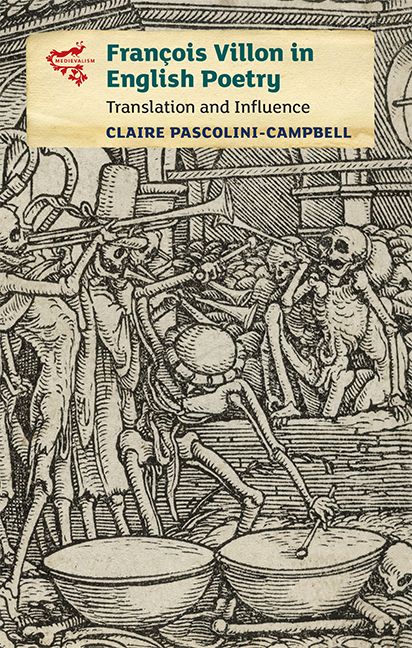Book contents
- Frontmatter
- Contents
- A Note on the Poets and the Poems
- Acknowledgements
- Introduction
- 1 Then and Now: The Legend of Villon in the Middle Ages and in Modernity
- 2 Villon and Swinburne: Finding and Singing Villon
- 3 Villon and Rossetti: Poetics of Strangeness
- 4 Villon and Pound: Modernity and the ‘Mediaeval Dream’
- 5 Villon and Bunting: Prison-Writing and Parody
- 6 Villon and Lowell: Imitation and the Visible Translator
- Conclusion
- Appendices
- Bibliography
- Index
- Medievalism
1 - Then and Now: The Legend of Villon in the Middle Ages and in Modernity
Published online by Cambridge University Press: 09 October 2019
- Frontmatter
- Contents
- A Note on the Poets and the Poems
- Acknowledgements
- Introduction
- 1 Then and Now: The Legend of Villon in the Middle Ages and in Modernity
- 2 Villon and Swinburne: Finding and Singing Villon
- 3 Villon and Rossetti: Poetics of Strangeness
- 4 Villon and Pound: Modernity and the ‘Mediaeval Dream’
- 5 Villon and Bunting: Prison-Writing and Parody
- 6 Villon and Lowell: Imitation and the Visible Translator
- Conclusion
- Appendices
- Bibliography
- Index
- Medievalism
Summary
READING ANY TEXT outside of its cultural and temporal specificity requires acts of interpretation and imagination, and the poetry of Villon is no different. Critics have often meditated on the distance separating a modern reader from a medieval text, with Paul Zumthor evocatively stating:
Entre ces vieux poèmes qui subsistent, et une culture retombée dans la nuit des temps, comment saisir les liens qui furent vécus, alors que ces mêmes liens nous apparaissent aujourd'hui si complexes et obscurs, entre nos propres textes et nous, dans l'univers auquel nous appartenons?
[Between these old poems that endure, and a culture long forgotten, how can we understand the bonds that were lived, when those same bonds appear today so complex and obscure, between ourselves and our own texts in the universe to which we belong?]
It is perhaps the case that creative writers have felt better able to bridge these daunting contextual and temporal gaps than have critics, the former having the benefit of a shared identity as artists which, as later chapters will show, is often presented as transcending cultural barriers. However, critics have other tools at their disposal and, in the case of Villon, we can look to three sources in particular for clues as to how his work may have been received in the fifteenth and early sixteenth centuries: the collection of comic tales known as the Repues franches; the preface to Clément Marot's edition of his poetry; and the Arts de seconde rhétorique, manuals of lyric versification. A survey of this evidence will permit us to draw several conclusions, stated simply in advance.
The first of these is that Villon's contemporaries were attracted, at least in part, to the same qualities in his work that have captivated today's readers. Then, as now, his picaresque, apparently autobiographical persona exerted a powerful pull, inspiring imitation and embellishment. The second is that while the legend of Villon's exploits (or those of his persona) was thriving as early as in the second half of the fifteenth century, his reputation as a serious poet might not have gained currency at all were it not for the favour of Marot.
- Type
- Chapter
- Information
- François Villon in English PoetryTranslation and Influence, pp. 16 - 31Publisher: Boydell & BrewerPrint publication year: 2018



